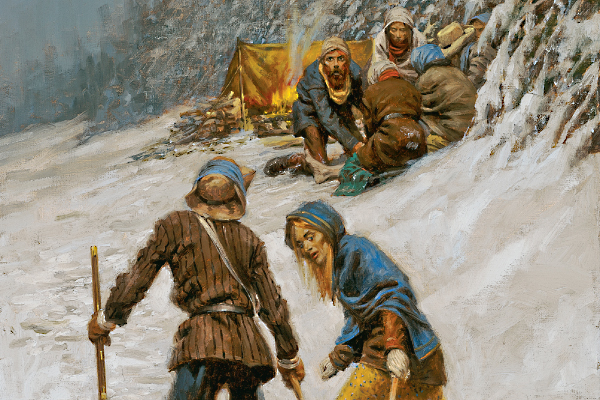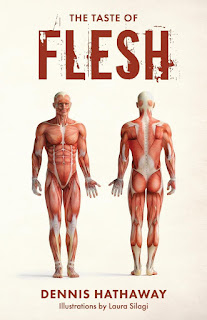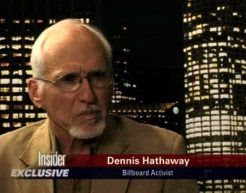For
me a good poem slips in through the layers of cultural conditioning
with enough startle and spin to bring focus and context to errant
idea fragments and give the familiar a fresh and knowing face. Good
poems touch me in ways that are hard to describe beyond the usual
adjectives. Complicating this difficulty is my vast academic
ignorance of poetry, its traditions, and subsequently the
conventional critical language that poetry scholars rely on to define
whether a particular work meets certain acceptable standards. A
saving grace for me is knowing that many poets celebrated today
prevailed over disfavor from the scholars of their day.
My
own feeble efforts penning the occasional verse have
given me a respect
infringing on awe for wordsmiths who dare to tread beyond the
boundaries set by those who’ve gone before. Dennis Hathaway is one
of those select few. His first collection of twenty-five poems, The
Taste of Flesh,
follows his story collection, The
Consequences of Desire,
which received the 1992 Flannery O’Connor Award for Short Fiction.
As
I am unqualified to render a conventional review of The
Taste of Flesh, I shall instead give you select snippets
of its exquisite wordplay, its stunning visuals, humor, and delicate,
soul-deep probes, many that left me slack-jawed, unable even to
mumble the superlatives struggling up from somewhere near the heart.
These
lines are from Cream, a reminiscence from his childhood on a Midwest
farm:
He
will remember the snow drifted against the barn,
He
will remember the horses that bolted, or kicked, or otherwise
misbehaved, Like surly children;
He
will remember those children, and his wife, and his own father,
Dispensing
wisdom that went down like medicine,
And
he will feel that straggling line of ancestry,
Disappearing
into the past.
And
then he will sigh, and all will be quiet, and gone.
And
this from the poem. Father, which has a Faulknerian feel:
And
thus the son says, Goodbye.
Your
strength, your endurance, your aphorisms,
They
will settle with you into the earth
Which
goes on, which persists despite our wanton recklessness,
And
into the dust will settle anger, resentment, guilt, sorrow,
And
you will be remembered,
And
loved.
And
here’s a little whimsy—with bite--from The Invention of Ideas:
It
would be interesting (for someone)
To
examine the persistence of failed ideas.
Propositions
that don’t bear scrutiny.
For
example: The trickle-down theory.
Why
not the trickle-up theory?
Money
in
The
hands of the poor will find its way to the rich
Who
own the banks, the fast-food franchises,
The
automobile dealerships.
For
aren’t ideas really gasps of confusion?
Smeared
ink? Blackboards imperfectly erased?
For
example: The trickle-down theory,
A
nice turn of phrase, almost poetic
And
more revealing than perhaps it was meant to be
By
its inventor, Mr. so-and-so with such-and-such degree.
The
title poem starts out almost whimsically, mentioning the tale of
sailors forced to cannibalism after their ship went down at sea. The
poem’s speaker wonders how human meat would taste...The arm, the
hip, the liver, the heart. He
describes how the captain butchered a sailor, trying to imagine
butchering a more familiar meat animal, and mentions another
well-known story of the pioneers caught during
a blizzard in the Donner Pass. He takes us with him during a
reminiscence
of being broke and homeless
as a teenager, and how he
spent the night on the couch of someone who had “wanted to get me
into his bed.”
I
knocked on his door
And
gruff with sleep his voice delivered the news
That
another man was there.
But
he gave me a blanket and use of the sofa
Just
for the remnant of the night.
Next
morning all he could find to eat was a box of matzos, Strange,
tasteless things for a boy/Just months from a Midwestern farm. I
ate them all...
If
not for the matzos
I
would have eaten the curtains
Over
the kitchen sink.
The
woodwork with its scabby
Layers
of paint.
The
worn linoleum on the floor.
But
would I have eaten one of the men?
The
one who softly snored,
Unaware
that I was creeping toward the bed
With
a long, sharp knife?
 |
| Donner Party preparing dinner |


No comments:
Post a Comment